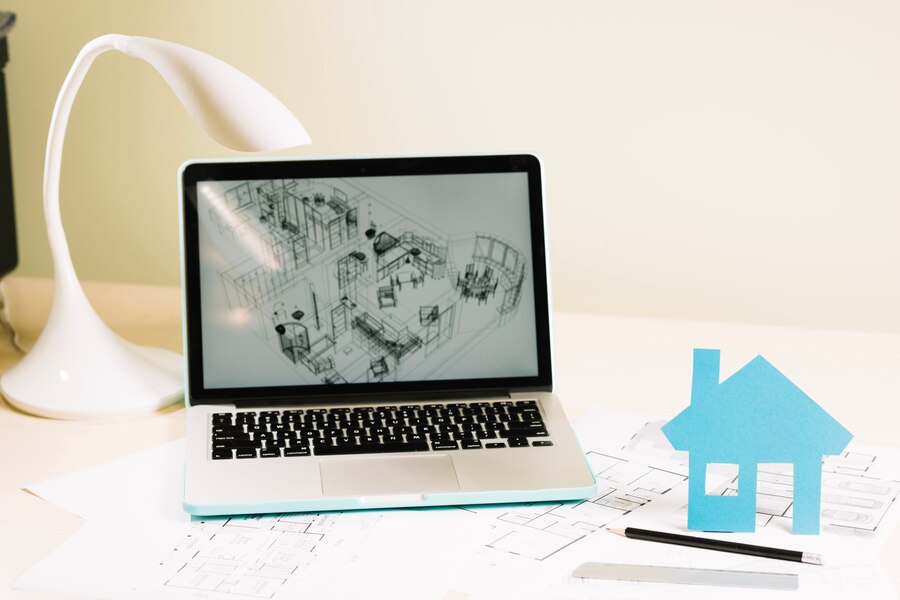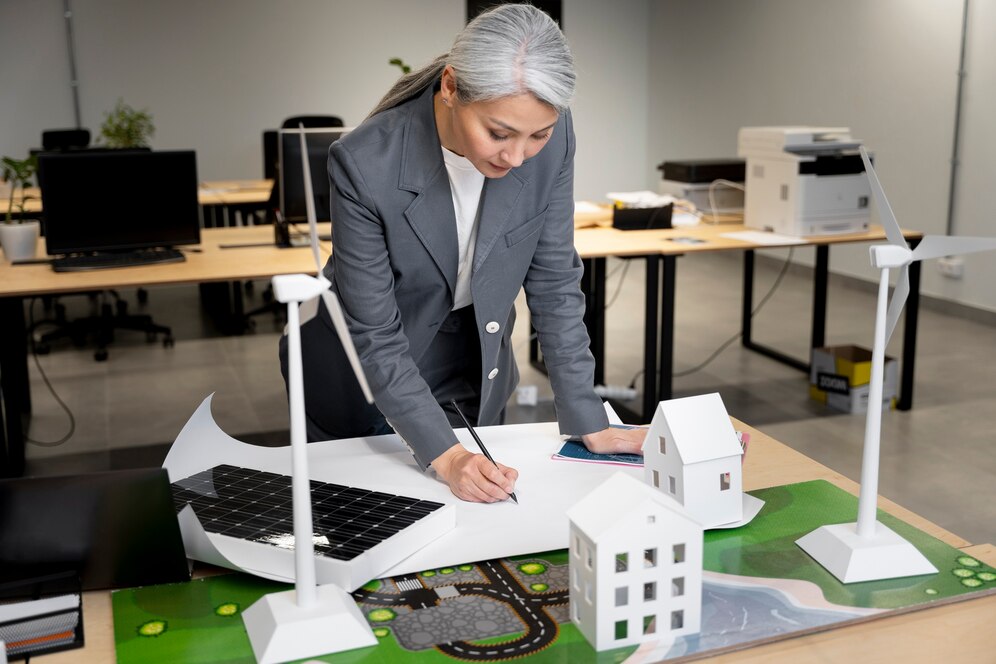
The Impact of AI on Urban Planning & Real Estate
AI is changing urban planning and real estate like never before. AI is changing how cities are designed, managed, and marketed. It ranges from data-driven decisions to automated property valuations. More people are moving to cities. AI offers new solutions for problems like housing shortages, traffic jams, and sustainability.
In real estate, AI is making property transactions easier. It also enhances customer experiences and gives precise market insights. This tech change boosts efficiency, cuts costs, and gives stakeholders useful data. In this blog, we’ll look at how AI affects urban planning and real estate. We’ll cover its main benefits, practical uses, expert tips, and what the future holds.
Key Benefits

1. Enhancing Urban Planning with AI-Powered Data Insights
AI is changing urban planning. It transforms how cities gather, understand, and use data. AI helps planners make better and faster decisions by processing large amounts of information from various sources.
- Data-Driven Planning: AI models use demographic data, satellite images, and social trends to predict how cities will grow.
- Real-Time Monitoring: AI sensors give live updates on traffic, pollution, and energy use. This helps cities act quickly.
- Predictive Modelling: Planners use AI to simulate different urban scenarios, forecasting the impact of zoning changes or new infrastructure.
In Singapore, AI-driven urban planning tools look at real-time data. They help improve traffic flow and optimise public transport routes. This reduces commute times and enhances mobility.
2. Automated Property Valuation and Real Estate Insights
AI is transforming the property valuation process, providing more accurate, data-driven appraisals. Traditional property valuations usually depend on manual checks. This process can take a lot of time and may lead to inconsistencies. AI offers:
- Precision and Objectivity: AI models assess location, property features, and market trends to deliver reliable valuations.
- Real-Time Updates: Automated systems give instant property value estimates. This helps investors decide faster.
- Enhanced Market Analysis: AI-powered platforms analyse historical trends, buyer preferences, and pricing patterns to identify market opportunities.
Zillow’s Zestimate tool uses AI to find property values. It looks at public records, recent sales, and data from users. This provides potential buyers with instant, accurate price estimates.
3. Improving Customer Experiences in Real Estate
AI is changing how customers engage in real estate. It provides personalised services and simplifies processes.
- Chatbots and Virtual Assistants: AI chatbots offer customer support around the clock. They answer questions and help buyers navigate property listings.
- Virtual Property Tours: AI-powered VR tours let buyers view properties from afar. This cuts down on the need for in-person visits.
- Predictive Recommendations: AI algorithms suggest properties based on what users like. This makes the recommendations more accurate.
In the UK, Purplebricks uses AI chatbots. They handle customer questions, schedule viewings, and give quick property info. This enhances efficiency and customer satisfaction.
4. Smart Cities: Sustainable and Efficient Urban Development
AI is key in building smart cities. It boosts efficiency, sustainability, and safety.
- Optimised Traffic Management: AI systems study traffic data. This helps cut congestion and boost transport efficiency.
- Energy Efficiency: Smart grids use AI to improve energy use. This cuts waste and lowers emissions.
- Improved Public Safety: AI surveillance systems spot suspicious behaviour and risks, making cities safer.
Barcelona uses AI traffic management systems. They monitor congestion patterns and adjust traffic signals in real time. This reduces gridlock and improves public transport efficiency.
5. AI-Powered Sustainability and Green Real Estate
AI is also driving sustainability in real estate and urban planning:
- Energy-Efficient Buildings: AI optimises heating, cooling, and lighting systems to reduce energy consumption.
- Eco-Friendly Urban Design: AI models show how new developments affect the environment. This helps promote sustainable city planning.
- Smart Waste Management: AI systems check waste levels and improve collection routes. This helps cut emissions.
The Edge building in Amsterdam uses AI technology to save energy. This makes it one of the most sustainable office spaces in the world.
Step-by-Step Guide
Step 1: Integrating AI into Urban Planning
To successfully integrate AI into urban planning, follow these steps:
Data Collection and Analysis
- Collect real-time data from satellite imagery, IoT sensors, and traffic monitoring systems.
- Use AI models to process and interpret the data, identifying trends and patterns.
Predictive Urban Modelling
- Use AI simulations to predict how zoning changes, new developments, and infrastructure upgrades will affect the area.
- Generate data-backed insights to guide planning decisions.
Implement AI-Optimised Infrastructure
- Use AI-powered tools for traffic management, energy efficiency, and public safety.
- Regularly update and refine the AI models to reflect changing urban conditions.
Step 2: Leveraging AI in Real Estate
To maximise the benefits of AI in real estate:
Automate Property Valuations
- Use AI-powered platforms to generate real-time property valuations based on data analysis.
- Incorporate automated valuation models (AVMs) to reduce human error and increase accuracy.
Enhance Customer Experience
- Deploy AI chatbots to answer inquiries and schedule viewings.
- Implement AI-driven virtual tours to showcase properties remotely.
Data-Driven Market Insights
- Use AI to analyse market trends and identify high-potential investment areas.
- Leverage predictive analytics to forecast future property prices and rental yields.
Additional Expert Tips & Common Mistakes to Avoid
Expert Tips
- Prioritise Data Security: Always follow strict privacy rules when using AI, especially in real estate deals.
- Work with AI experts: Team up with AI companies to tailor solutions for your business needs.
- Use AI for Smart Contracts: Let AI-powered blockchain contracts automate and secure real estate deals.
Common Mistakes to Avoid
- Over-Reliance on AI: While AI offers valuable insights, it should complement human expertise rather than replace it.
- Neglecting Ethical Concerns: Be transparent about data usage and privacy to avoid legal and ethical issues.
- Ignoring Model Bias: Ensure that AI models are regularly updated to prevent biased or inaccurate predictions.
Advanced Insights

1. AI-Driven Smart Contracts in Real Estate
- Use AI-powered blockchain contracts to automate transactions and enhance transparency.
- Smart contracts streamline property deals, reducing legal complexities and improving efficiency.
2. AI-Enhanced Digital Twins for Urban Planning
- Digital twins are virtual city models. They use AI to mimic real-world conditions.
- Planners can try out different scenarios. This helps them predict how urban changes will affect the area before they make any changes.
3. AI-Powered Investment Strategies
- AI algorithms look at market trends, rental yields, and property performance. This helps investors make better decisions.
- Real estate investors use AI to predict where growth will happen. This helps them reduce risk and increase returns.
AI’s Transformative Role in Urban Planning & Real Estate

AI is changing urban planning and real estate. It makes these fields more efficient, accurate, and sustainable. AI is changing city planning and property management. It helps with data-driven decisions, automated property valuations, and engaging customers.
As cities grow, AI urban planning will be key. It helps create sustainable, efficient, and resilient environments. In real estate, AI will make transactions easier, cut costs, and give stakeholders useful insights.
Are you ready to embrace the future of AI-driven urban planning and real estate? Share your thoughts and insights in the comments below!

